
Leiden research into Dutch parliamentary elections – a reading list
On 17 March, the Dutch may go to the ballot box to choose a new parliament. What are the most pressing issues, trends and traditions defining these elections? Leiden researchers have mapped the most important developments from an academic viewpoint. This reading list, compiled from the Leiden University Libraries’ (UBL) collections, can help put the most recent campaign developments in perspective.
The state of democracy in the Netherlands
Where does democracy in the Netherlands currently stand? Are our institutions healthy, or does our system need an update? Wim Voermans and Ruud Koole, for example, both address these questions head-on, but they are by no means the only Leiden University researchers analysing the challenges and problems present in the Dutch political system.
All books on the list below are available for loan or digitally available via the UBL by following the link under the title or by searching our Catalogue.
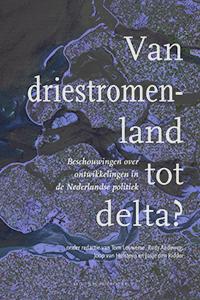
T. Louwerse, R.B. Andeweg, J.J.M. van Holsteyn en J. den Ridder (red.) Van driestromenland tot delta? Beschouwingen over ontwikkelingen in de Nederlandse politiek
2019
Post-war politics in the Netherlands was dominated by three main political currents: Christian Democracy, Social Democracy and Liberalism. Since the last turn of the century, however, these currents are being challenged from the left and the right by new parties putting forward new political agendas. In this collection of essays, Leiden staff members venture to explain the causes behind these developments and what possible consequences (opportunities and/or dangers) these developments could entail for the Dutch political system.
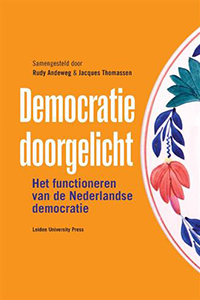
R.B. Andeweg en J.J.A. Thomassen, Democratie doorgelicht: Het functioneren van de Nederlandse democratie
2018
Rudy Andeweg, emeritus professor of empiric political science, has evaluated the functioning of Dutch democracy in several books. In 2011, he and Jacques Thomassen edited Democatie doorgelicht, a collection of essays in which fifty Dutch political scientists subjected the Netherlands to a 'democratic audit'. Themes like the waning trust of the Dutch electorate in their political institutions, the growing distance between elected officials and the voter, and growing populist movements are all addressed extensively.
In 2018, Andeweg’s colleagues published an anthology of his scientific works, again focussing on the functioning of Dutch democracy.
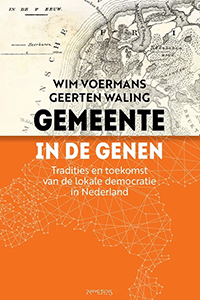
W. Voermans en G. Waling, Gemeente in de genen: Tradities en toekomst van de lokale democratie in Nederland
2018
Leiden residents will not only vote in parliamentary elections on 17 March. They will also vote in an advisory referendum, deciding the fate of the Roomburgerpark, which has been slated for large scale renovations. Democracy indeed doesn’t just develop on the national stage, but locally as well. In 2018, Leiden researcher Geerten Boogaard was co-editor of De gemeenteraad and in January of this year, Joost Westerweel defended his doctoral thesis about the legal implications of innovations in local democracy.
In De Gemeente in de Genen Wim Voermans and Geerten Waling offer a historic overview of, and a passionate plea for, local democracy. The roots of Dutch democracy lie on the local level. Even the Eighty Years War against Spain could be explained as a clash between Spanish centralism and local self-government in the Low Countries. Voermans and Walling see the excessive implementation of technocratic solutions and increasing scale as the most important threats to local democracy in the Netherlands.
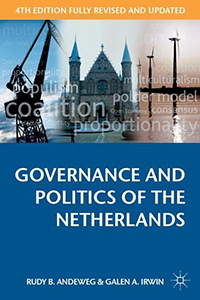
R.B. Andeweg, G.A. Irwin & T. Louwerse, Governance and Politics of the Netherlands
2020
For newcomers eager to immerse themselves in Dutch politics, there is of course the handy guide The Dutch political system in a nutshell (2008) published by the Netherlands Institute for Multiparty Democracy.
For those who want to know more, there is the textbook Governance and Politics of the Netherlands, by Leiden staff members Rudy Andeweg and Tom Louwerse. The book systematically discusses all aspects and institutions of the Dutch democratic system but also examines recent political developments, the emergence of new political parties and changes in Dutch political culture.

R. Aerts, C. van Baalen, J. Oddens, D. Smit & H. te Velde, In dit Huis. Twee eeuwen Tweede Kamer
2015
In 2015, the lower house of the Dutch Parliament celebrated its two hundredth anniversary. Leiden scholars and scientists collaborated with others to create a celebratory publication, focussing on the functioning of parliament as an institution and developments in parliamentary political culture. The ‘political game’, on full display during plenary sessions, is put front and centre, as are the written and unwritten rules of parliamentary debate. But also the evolution of constitutional duties of parliament, of commissions, and developments in parliamentary journalism receive ample attention.
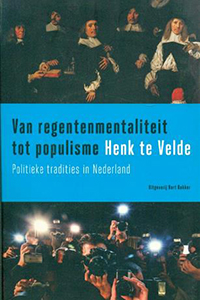
H. te Velde, Van regentenmentaliteit tot populisme. Politieke tradities in Nederland
2010
Populism has become a fixed element in Dutch political culture, which was traditionally characterized by deliberation, depoliticisation and, so-called polderen. Despite this image, populism has deeper roots in the Netherlands than one might think, and political culture, too, is subject to more change than often perceived. In this book, professor Henk te Velde provides an overview and analysis of developments in Dutch political culture and the relationship between deliberative culture ('polderen') and populism.
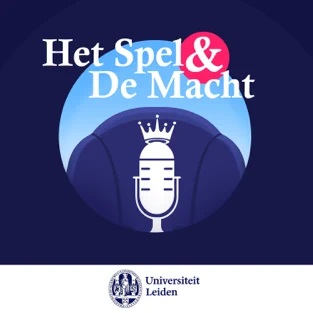
Nieuwscheckers en Podcasts
Leiden researchers share knowledge and information about the current general election campaign via several media. The Leiden website nieuwscheckers.nl, for example, regularly checks statements and claims by Dutch politicians and parties.
Centrum voor Nederlandse Politiek en Bestuur (Centre for Politics and governance in the Netherlands) in Leiden also produces a podcast-series about the current elections, titled ‘Het spel & de Macht’. In this podcast, Leiden researchers answer questions like: Why do we even hold elections, how do politics change during a crisis and how resilient is our democracy?

Do your own research
There are multiple ways to do your own research on elections and electoral campaigns. One useful resource is the newspaper database Nexis Uni, offering access to the recent editions of more than 75 Dutch newspapers and magazines, for example: Algemeen Dagblad, De Telegraaf, NRC Handelsblad, Parool, Trouw en De Volkskrant. You just need your ULCN-account to log into the database.
Is a book missing on this list, or would you like the UBL to purchase a book about Dutch politics or elections that is not yet available in our collections? Contact our faculty liaisons.
